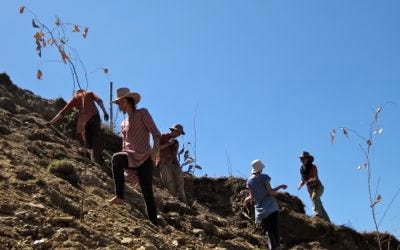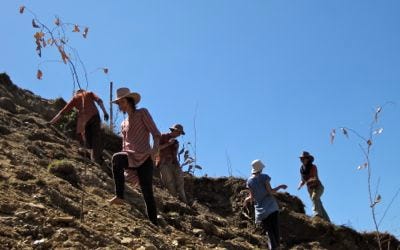When we think of meditation retreats, the image that often comes to mind is one of quiet hillsides, lush forests, or dedicated centers far removed from conflict and noise. But the organization SanghaSeva has been quietly and radically changing that narrative for over two decades.
Founded on the principles of engaged Buddhism, SanghaSeva offers retreats in places that might challenge our comfort, push the boundaries of silence, and invite us to act with wisdom and compassion. One of their most powerful initiatives takes place in the long-contested land of Israel and Palestine—a retreat unlike any other.
The Spirit of Engaged Presence
SanghaSeva was born from a deep desire to bring contemplative practice into direct contact with suffering and systemic violence—not as a way to fix, but to respond: to be with, to listen, to hold space, and embody freedom. The organization operates with the understanding that real transformation begins in the heart—and that hearts open most in the presence of courageous vulnerability.
Their Israel-Palestine retreat is a living example of this.
It is not a tourist trip. Nor is it a political campaign. It is a gathering of people committed to presence and humility. And to acting from their deepest values. Over the course of several days, participants—often from diverse backgrounds and belief systems—meet in silence, engage in dialogue, walk through the scarred landscapes of East Jerusalem or the West Bank, and practice meditation side-by-side with those who live amid the everyday complexities of occupation and trauma.
What Happens on the Retreat?
Facilitated by long-term meditation teachers, Nathan Glyde and Zohar Lavie, the retreat begins with grounding. Participants are gently invited into shared silence, learning to anchor themselves in mindfulness before stepping into spaces charged with pain, resilience, and deep history.
During the retreat, the group may:
Meet with Palestinian farmers facing land dispossession.
Engage in dialogue with Israeli activists working for peace and justice.
Walk silently through sites of loss, listening not just with ears but with the whole body.
Participate in positive actions like protective presence, to support peaceful farmers reach to land with restricted access.
There is no preaching. No forced reconciliation. What unfolds is subtler and perhaps more profound: a mutual recognition of humanity, and an acknowledgment that bearing witness is itself a powerful form of peace-making.
Bearing Witness, Without Fixing
This retreat challenges the often Western drive to “solve” problems. Instead, it echoes the Zen Peacemaker Order's first tenet: Not-knowing: a deep path that leads between preconceived assumptions and stalled bewilderment. To come not with answers, but with open-hearted attention.
Many participants describe moments of disorientation, grief, even anger—but also unexpected glimpses of connection, and of what Thich Nhat Hanh called “inter-being.” One step in Nablus becomes a step for everyone. One tear in Bethlehem carries the salt of collective sorrow.
And out of this, something shifts.
Is This Political?
Inevitably, some might ask: isn't this political?
SanghaSeva doesn’t deny the politics. But it reframes the question. Their work is not about taking sides; it’s about staying with the human. About practising non-duality in a place historically split by walls—physical, psychological, and ideological.
As retreatants walk, speak, and act with both Israeli and Palestinian individuals and communities, the lines blur. Suffering doesn't fit neatly into narratives. Neither does hope.
A Different Kind of Action
In a world often polarized by noise and reaction, this kind of quiet listening and wise response is a form of radical action. Not one that demands headlines or slogans, but one that touches the roots of transformation.
The Israel-Palestine retreat reminds us that Buddhist practice is not just about calming the mind—it’s about embodying our deepest values of liberation for all beings everywhere in all times. This retreat is not afraid of engaging the world with clarity, compassion, and fierce tenderness. It's about listening when we’d rather speak, staying when we’d rather look away, and daring to bring all our skill and care into our world that needs it so much.





